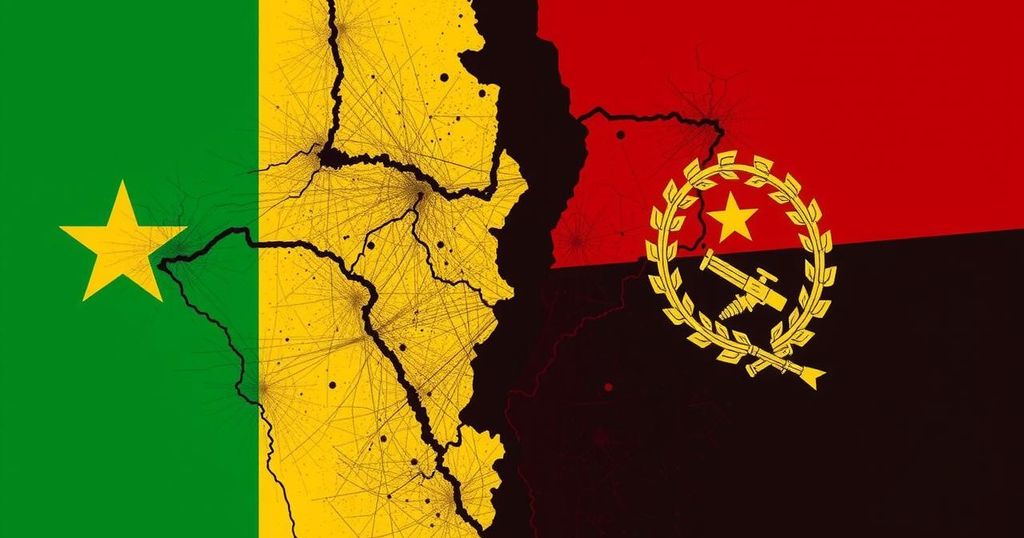Renewed Violence in Eastern DRC Provokes Angolan Concerns
Renewed violence in eastern DRC has raised concerns from the Angolan government, hindering recent efforts for a long-term ceasefire. Clashes in Kalembe involve M23 rebels and Congolese forces, igniting fears of escalating conflict. Angola condemns these actions and emphasizes the need for respect of ceasefire agreements, while ongoing diplomatic dialogues between the DRC and Rwanda seek to address underlying security issues threatening regional stability.
The Angolan government has expressed alarm following the resurgence of violence in eastern Democratic Republic of Congo (DRC), undermining its efforts to establish a long-term ceasefire after a month of relative calm. Fighting erupted in the town of Kalembe, located in the Walikale territory of North Kivu Province, as M23 rebels engaged Congolese Armed Forces (FARDC) on Monday. This violent outbreak occurred just after M23 forces had momentarily seized control of Kalembe before being repulsed by the FARDC. Luanda condemned the renewed clashes as a blatant violation of the ceasefire agreement that became effective on August 4, following a ministerial meeting on July 30. Angola has been actively mediating between the DRC and Rwanda, both of whom accuse each other of facilitating rebel actions that threaten their governance. The latest discussions occurred about two weeks ago in Luanda, where both parties reaffirmed their commitment to pursuing peaceful resolutions. While Kinshasa assured that it would not support the FDLR rebels, deemed hostile by Kigali, this assurance was conditional on Rwanda ceasing its backing of M23. In a formal statement, Angola labeled the recent violence as a hostile act that jeopardizes ongoing mediation efforts aimed at resolving the DRC’s conflicts, urging the involved factions to adhere to the terms of the ceasefire highlighted in the September 14 meeting. Reports indicate that the conflicts stemmed from clashes between the Wazalendo self-defense group, allied with the Congolese army, and M23 rebels, with the FARDC apparently regaining control of Kalembe. Juvenal Munubo, a former Member of Parliament, acknowledged that the NDC Rénové, a Kivu armed group, received logistical backing from the FARDC, allowing them to retake Kalembe, asserting the need for consolidation of this military success. Moreover, MP Willy Mishiki revealed that the rebels aim to capture three additional provinces: South Kivu, Tshopo, and Maniema. Despite a ceasefire that had been largely effective since August, enabling some displaced individuals to return to their homes, the DRC’s administration has dismissed the possibility of negotiations with the M23. Meanwhile, discussions are ongoing between DRC and Rwanda, aiming to address security matters linked to a proposed peace agreement. On October 12, during the fifth conference of foreign ministers from both nations, they agreed to persist in addressing outstanding security challenges in relation to the draft peace framework. Angola has strongly advocated for restraint to prevent further conflict escalation, which would exacerbate the precarious humanitarian issues facing eastern DRC. They reiterated commitment to a persistent resolution effort within the parameters of the Luanda Process facilitated by President João Lourenço and guided by the African Union’s auspices. Additionally, plans were made to implement a verification mechanism to oversee peace endeavors, with official operation envisioned in Goma, DRC, by November 5, 2024. The latest clashes have reportedly resulted in injuries to at least 14 civilians, compelling numerous people to flee their homes. The United Nations High Commissioner for Human Rights estimates that approximately 940,000 individuals may be displaced in 2024 alone, raising the total displaced population in DRC to near seven million. Consequently, civilians in North Kivu remain vulnerable to severe overcrowding and egregious violations, including incidents of sexual violence.
The situation in eastern DRC has been marked by persistent violence from various armed groups, notably the M23 rebels, who have historically engaged in conflicts over territorial control. The DRC government has faced accusations from neighboring Rwanda regarding its alleged support for rebel factions considered a threat to stability. In contrast, Kinshasa accuses Rwanda of backing M23, exacerbating regional tensions. Angola’s mediation efforts are central to attempts at establishing peace between the two nations and addressing the ongoing humanitarian crises resulting from the conflicts. The recent outbreaks of violence highlight the fragile nature of ceasefire agreements and the challenges in maintaining peace in a heavily militarized region.
In summary, the recent resurgence of violence in the Democratic Republic of Congo has invoked strong reactions from the Angolan government, which seeks to mediate peace between the DRC and Rwanda. The ongoing conflicts, particularly in Kalembe, threaten the ceasefire efforts and exacerbate the humanitarian crises faced by millions in the region. As Angola continues its diplomatic interventions, the importance of adhering to ceasefire terms and fostering dialogue remains paramount to achieving long-term stability.
Original Source: www.ghanaweb.com




Post Comment